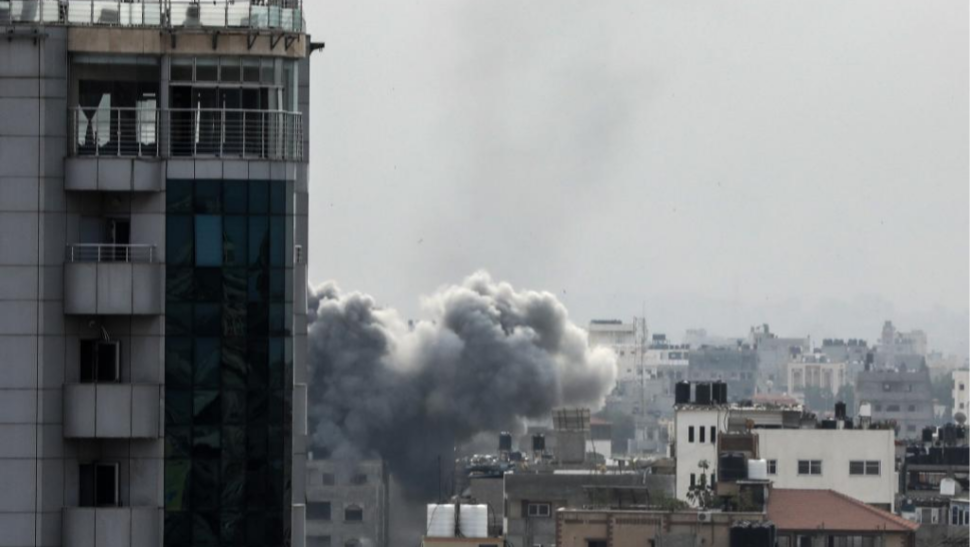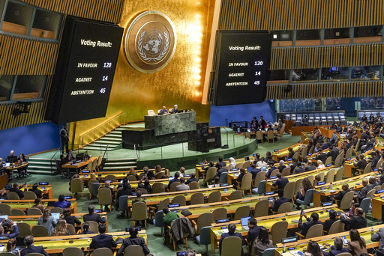
Smoke rises after Israeli airstrikes in Gaza City, October 29, 2023. /Xinhua
Smoke rises after Israeli airstrikes in Gaza City, October 29, 2023. /Xinhua
Editor's note: Hafijur Rahman, a special commentator on current affairs for CGTN, is a columnist and security and strategic analyst, working in a prominent Strategic Studies Center in Bangladesh. The article reflects the author's opinions and not necessarily the views of CGTN.
While Israel's brutal retaliatory war on Gaza rages on, with the Palestinians paying the "price for waging war," a harrowing phrase the U.S. President recently used to justify the killings of innocent Palestinian civilians by the Israeli forces in their current brutal "war of revenge," the U.S. has persisted in rejecting calls for a ceasefire in Gaza.
Speaking at a press briefing on October 30, U.S. National Security spokesperson John Kirby dismissed growing global calls for a ceasefire between Israel and the Palestinian group Hamas as being not the "right answer right now," lending credence to Israeli Prime Minister Benjamin Netanyahu's peace-defying declaration that "this is a time for war." Yet, right on the same day, the commissioner general for the main UN agency in Palestine told the UN Security Council that the entire population of Gaza is becoming "dehumanized" while saying a ceasefire has become a matter of life and death for millions.
According to the most recent UN estimates and data from Gaza's health ministry, more than 8,500 Palestinians have been murdered in Gaza since Israel's terrible assault on Palestinians erupted. With over 3,000 children murdered in Gaza in only three weeks, relief group Save the Children reports that the number of children killed in Gaza has now exceeded the yearly global total for children killed in war zones since 2019. Additionally, amid overcrowding, mass displacement, and damage to infrastructure to water and sanitation infrastructure, the World Health Organization (WHO) warned of an imminent "public health catastrophe" in Gaza.
In this horrific context, the calls for peace in the war have been getting louder across the world in contrast to the United States' continuous denying of the ceasefire call. The virtue of peace, which the United States and its Western allies are inveterately used to parroting and preaching to the rest of the world, has been consistently downplayed.
The United States has a long history of hypocrisy and double standards in its foreign policy. The current cataclysmic situation in Gaza and the subsequent U.S. unwaveringly one-sided pro-Israeli stance, albeit at an unbearably huge price to the Palestinians, have further laid bare the hollowness of America's "value-based" foreign policy assertion to the new generation. This has provided them an unfortunate opportunity to draw parallels between the current conflict in the Middle East and Ukraine.
While volumes are being discussed about the U.S.'s hypocritical and overboard pro-Israeli policy stance on the war, widely questioning its credibility and moral standing, one glaring development is largely missing from the scene. For the United States continuing to throw its weight fully behind war, it has increasingly found itself isolated on the world stage. At least, the way a recent United Nations General Assembly resolution on the Israel-Palestine conflict, several callings for an "immediate, durable and sustainable humanitarian truce," were voted down has starkly manifested this evolving pattern.

Voting results are displayed as the Unite Nations General Assembly voted on a nonbinding resolution calling for a "humanitarian truce" in Gaza and a cessation of hostilities between Israel and Gaza's Hamas rulers, New York, U.S., October 27, 2023. /CFP
Voting results are displayed as the Unite Nations General Assembly voted on a nonbinding resolution calling for a "humanitarian truce" in Gaza and a cessation of hostilities between Israel and Gaza's Hamas rulers, New York, U.S., October 27, 2023. /CFP
Drafted by 22 Arab countries, the United Nations General Assembly adopted a resolution by a vote of 120 to 14, with 45 abstentions on October 27. After just 12 nations sided with the United States and Israel to oppose a resolution at the United Nations General Assembly, the United States looked quite alone. The Pacific islands of Fiji, Tonga, the Marshall Islands, Micronesia, Nauru, and Papua New Guinea accounted for six of the votes cast for the United States.
Even though America's Pacific Compacts of Free Association (COFA) allies – Micronesia, the Marshall Islands and Palau – have a long history of siding with the United States at the UN, Palau abstained from voting. Additionally, many suggested that the U.S. was able to secure six votes from the Pacific area, while many others abstained because of the aid those nations got from the U.S. On the broader count, the number of the countries that stood by the U.S. in voting against the resolution represents only a small proportion of seats at the General Assembly.
Even though the resolution is not legally enforceable, it has functioned as "an unmistakable barometer of global opinion," clearly illustrating how the U.S. staunch support of the war has got down to the global community. While the escalating death toll and destruction in Gaza has heightened international support for a humanitarian truce, America's antithetical position against a purely humanitarian cause has left it as a "lonely superpower."
(If you want to contribute and have specific expertise, please contact us at opinions@cgtn.com. Follow @thouse_opinions on Twitter to discover the latest commentaries in the CGTN Opinion Section.)



